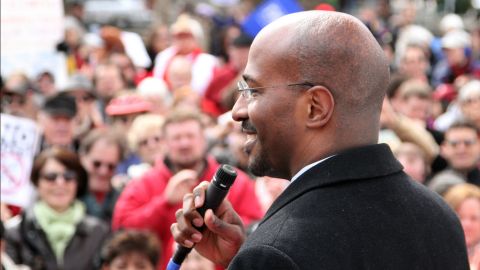Is Bipartisanship Overrated?

What’s the Big Idea?
Just before he was elected in 2008, Obama noted an urgent need for politicians to give up “polarizing debate” and get things done. Across-the-aisle collaboration was to be one of the guiding forces behind his presidency. Two weeks after he took office, the New York Timesreported breathlessly that the President’s initial steps suggested a bipartisan flair. Three years after that, in December of 2011, Republicans (under Senate minority leader Mitch McConnell) were threatening to shut down the government due to fundamental disagreements over a bill.
Momentary enthusiasm, a few nice words at the inauguration, then gridlock: it’s the ebb and flow of electoral politics in America, and it’s lead liberal and conservative insiders alike to argue that representatives ought to capitulate every now and then, if only for the sake of negotiation.
In a recent interview, Big Think asked Van Jones, former advisor to the White House and author of Rebuild the Dream: Is there an issue that Democrats should drop in 2012?
Not a single one, says Jones. “Anybody who is in public life needs to find out what they believe in. And public life will test you. You may think you know what you believe until you get put over those hot coals of public life.” (As an advisor to the White House, he came under fire for his activism and for an erroneous rumor that he had signed a 9-11 Truth petition, ultimately resulting in his resignation.)
“Which [value] should Democrats betray? Should we say, ‘Listen, we don’t care about America the Beautiful any more? We’re going to get in bed with the oil spillers and the clear-cutters and the mountaintop removers and the people who want to destroy America’s beauty for profit?’
Jones’ views on climate change, immigration, gay rights, and socio-economic equity are non-negotiable — and he’s proud of that. When it comes down to it, consensus is nice, but standing up for your values is essential. “[Are we] supposed to give up the idea of liberty and justice for all? Oh, okay, we believe in liberty and justice for all, just not for the gay people. You know, just leave them out. Or not for those poor urban black kids. We’ll leave them out. We’ll give them justice based on their hoodies they’re wearing rather than based on what they’re actually doing. Which American value are we supposed to betray?”
What’s the Significance?
Politics is about is figuring out individually and collectively what kind of country we want to live in. Democracy is about is making sure that vision is as inclusive as possible. It’s not a radical idea, says Jones. The desire to maintain the social safety net that fuelled the country’s explosive growth during the “American Century” is actually conservative, in that it’s based on preserving systems that are already in place. The America we know today was built on cooperation, infrastructure, and pooled resources — not on the principles of the free market. If we want to keep it that way, we’ll need to invest together in things like roads, education, public housing.
“That’s why people want to come here, not just because we’ve got a big GDP,” he says. “You can have a great GDP and have people working in sweatshops and have the water and the air poisoned. That’s not America… I’m not going to let people take a wrecking ball, paint it red, white and blue and smash down every American achievement for the last century and call that patriotism.” Framed this way, patriotism is inextricably linked with liberty and justice for all — and it’s the for all part that must be tirelessly defended.





